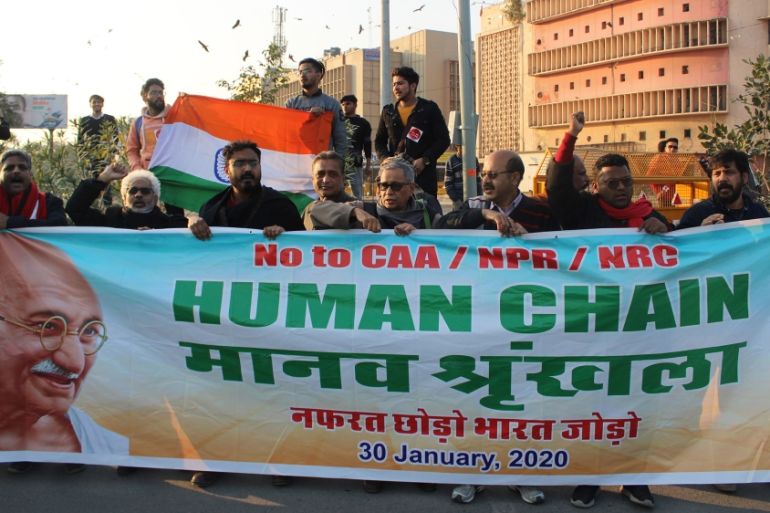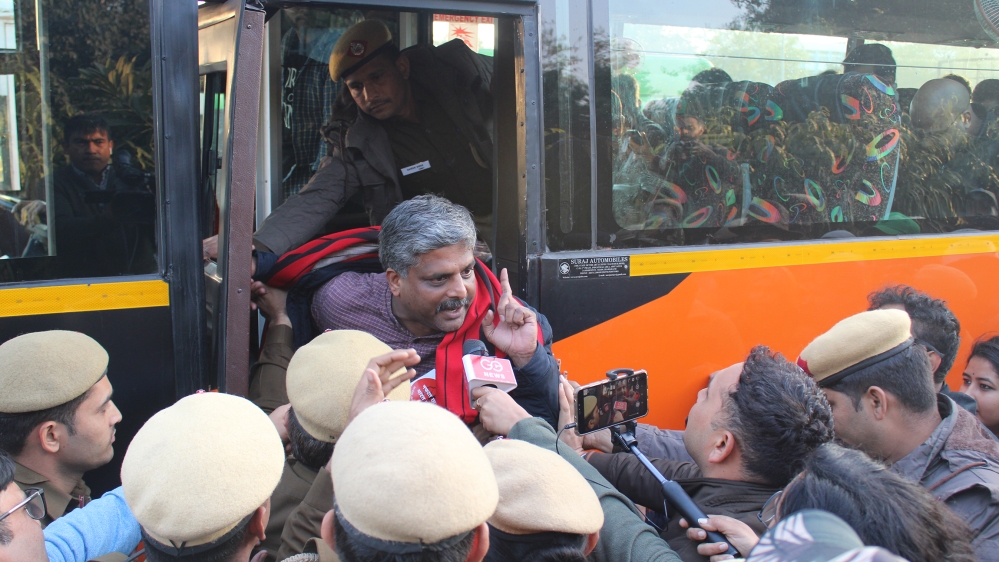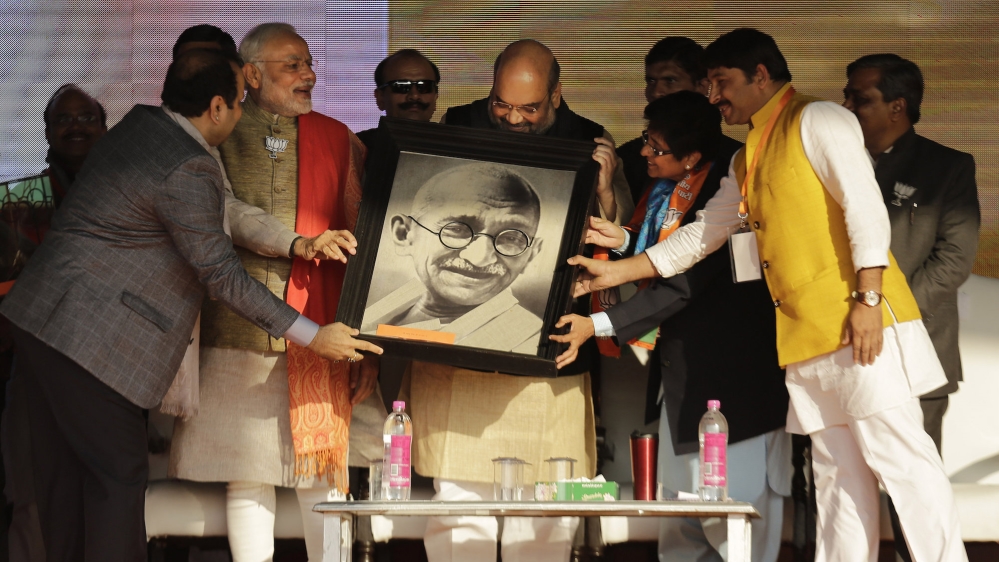Gandhi’s death anniversary galvanises India’s anti-CAA protesters
As demonstrators mark martyrdom of iconic freedom fighter by holding protests, many accuse BJP of doublespeak on Gandhi.

New Delhi, India – Dozens of people, carrying placards and India‘s tricolour flags, formed a human chain near a Mughal-era gate in the capital, New Delhi, to mark the death anniversary of iconic freedom fighter, Mahatma Gandhi.
As more people on Thursday afternoon joined the chain and a call to observe silence in memory of Gandhi was issued by the organisers, a contingent of police stationed nearby rushed to the spot and detained them.
Keep reading
list of 3 items‘Only way we Indians know Gandhi is on currency notes’
India: PM Modi slams BJP candidate’s Gandhi assassin comments
While the police officers were bundling detainees into buses parked there, another group of people carrying a large Indian flag stretching up to several metres emerged from the other side of the road.
Led by activist Yogendra Yadav and senior Supreme Court lawyer Prashant Bhushan, the group chanted India’s national anthem and raised slogans.
“Bapu, we will fulfil your dream of a secular India,” they shouted. Gandhi is fondly referred to by many Indians as “Bapu” (father in Hindi).

‘Police resorting to excesses’
Within minutes, the new group of demonstrators was also detained. “These [policemen] are violating law and resorting to excesses,” Bhushan told reporters while he was whisked away.
Nand Kishore Shukla, a protester, said the police prevented them from remembering Bapu.
“We assembled here in memory of Gandhi, but police are not allowing us to make a human chain,” he told Al Jazeera.
Organisers said thousands of people were expected to participate in the human chain. They alleged police revoked permission at the last moment and detained people instead.
Authorities even closed three metro stations in the area and deployed policemen at several places in the capital to stop people from gathering for the protests.
“We had expected 15,000 to 20,000 people to turn up,” said Amrita Johri, one of the activists.
However, a few hundred managed to gather near the Mughal-era Red Fort and held a peaceful protest.

Why Gandhi matters
Indians observe January 30 every year as a day to honour Gandhi’s death, with the country’s top leaders paying their tributes at Raj Ghat, a sprawling memorial on the banks of River Yamuna in New Delhi.
However, this year, the day gained more significance for tens of thousands of protesters across India, who have been hitting the streets for more than a month to demand the withdrawal of the Citizenship Amendment Act (CAA), which critics say violates India’s secular constitution and is anti-Muslim.
Gandhi is considered a symbol for a secular and inclusive India. His model of truth-telling and peaceful resistance by holding fasts is frequently emulated by Indian protesters.
Gandhi lived and died for Hindu-Muslim harmony.
On Thursday, several civil society groups and student bodies across India called for protests to “save” secularism which they say is under threat under Prime Minister Narendra Modi‘s government.
On January 30, 1948, Gandhi was assassinated by Nathuram Godse, a Hindu zealot who accused the freedom fighter of pandering to Muslims and held him responsible for the country’s partition in 1947, which led to the formation of Pakistan.
Born on October 2, 1869, in Porbandar in the western state of Gujarat, Mohandas Karamchand Gandhi’s non-violent resistance not only led India to a successful campaign for independence from the British in 1947, but also inspired movements for civil rights and freedoms across the world.
“Gandhi stood for a secular India, and was killed for saying India should be a secular country where we provide rights to everyone, including minorities, especially Muslims,” Johri told Al Jazeera.

Right-wing’s ‘doublespeak’ on Gandhi
Despite Godse, believed to be a member of the Rashtriya Swayamsevak Sangh (RSS), killing Gandhi, India’s right-wing has, ironically, always appropriated Gandhi as a national figure.
RSS, which draws inspiration from European fascism between the two world wars, is the ideological mentor of the ruling Bharatiya Janata Party (BJP) and leads a network of organisations accused of inciting hatred and violence against India’s Muslim and Christian minorities.
Since Modi came to power in 2014, he has invoked Gandhi not only in his public statements, but also in various policies started by his government, the most famous being the Clean India campaign.
Modi has also used Gandhi to defend the CAA.
“I repeat again, the citizenship act is not to revoke anyone’s citizenship, but to give citizenship. After independence, Mahatma Gandhi and other big leaders of that time believed India should give citizenship to persecuted religious minorities of Pakistan,” he said earlier this month during a speech in the eastern state of West Bengal.
Many in India accuse Modi and his party of doublespeak on Gandhi.
Several BJP leaders and supporters have openly expressed their admiration for Godse, calling him a patriot, including a hardline member of parliament Pragya Singh Thakur, who was once charged with terrorism.
“[Gandhi] was murdered by the vicious ideology of hate and today the same ideology is ruling India,” Kawalpreet Kaur, a left-wing student activist, told Al Jazeera.
‘CAA a step towards Hindu nation’
Speaking to Al Jazeera, Indian historian and columnist Ramachandra Guha accused the BJP of “distorting and falsifying” Gandhi’s views on a subject like the CAA.
“Gandhi lived and died for Hindu-Muslim harmony. Gandhi wanted that Muslims in India should have equal and full rights. The new legislation puts them under threat and makes them vulnerable and insecure,” he said.
Guha said the anti-CAA demonstrators have adopted non-violent means of protest, which is in line with Gandhi’s principles.
“But it is the government that is betraying Gandhi at every step,” he said. “CAA is a step towards making India a Hindu nation and that Gandhi would have totally opposed.”
Gandhi and other big leaders of that time believed India should give citizenship to persecuted religious minorities of Pakistan.
BJP spokesman Shahnawaz Hussain rejected the allegations, saying his party believes in “sabka saath, sabka vikas” (a BJP poll slogan that means fraternity and development for all).
“Had India wanted to be a Hindu state, it would have become one long ago, but India chose to be a secular, democratic nation,” he said.
Hussain said the BJP has “fulfilled Gandhi’s dream” by bringing in the CAA. “Today, Gandhi’s soul would be happy,” he said.
Nationwide anti-CAA protests
Last month, India’s parliament passed the CAA to grant citizenship to non-Muslims from Pakistan, Bangladesh and Afghanistan, who came to India before 2015. The BJP called it a “humanitarian gesture”.
However, opposition parties and critics say the law goes against India’s secular constitution and is meant to turn the country’s 200 million Muslims, who form nearly 15 percent of its 1.3 billion population, into second-class citizens.
Seen together with a proposed nationwide National Register of Citizens (NRC) and an ongoing National Population Register (NPR) exercise, many fear the moves will force people to prove their nationality by showing the required documents.
A large number of Indians, mainly its poor, say they do not have legacy documents to prove their citizenship. Muslims fear the moves are aimed at their marginalisation.
Fears over CAA, NRC and NPR have prompted significant protests across India, in which at least 29 people have lost their lives since December 11.
On Thursday, a gunman, who cannot be identified for being a minor, opened fire at a crowd of protesters in New Delhi, wounding a student from Indian-administered Kashmir.
|
|